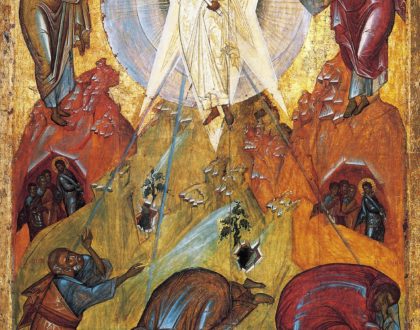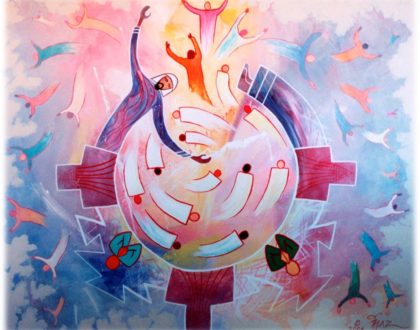July 8 // Deuteronomy 1
by Julie Hordyk
Invitation:
God of Ages,
Psalm 141:2
Let me prayer be counted as incense before you,
and the lifting of my hands as an evening sacrifice.
Deuteronomy 1:1, 3-8
Events at Horeb Recalled
1 These are the words that Moses spoke to all Israel beyond the Jordan—in the wilderness… 3 In the fortieth year, on the first day of the eleventh month, Moses spoke to the Israelites just as the Lord had commanded him to speak to them. 4 This was after he had defeated King Sihon of the Amorites, who reigned in Heshbon, and King Og of Bashan, who reigned in Ashtaroth and in Edrei. 5 Beyond the Jordan in the land of Moab, Moses undertook to expound this law as follows:
6 The Lord our God spoke to us at Horeb, saying, “You have stayed long enough at this mountain. 7 Resume your journey, and go into the hill country of the Amorites as well as into the neighboring regions—the Arabah, the hill country, the Shephelah, the Negeb, and the seacoast—the land of the Canaanites and the Lebanon, as far as the great river, the river Euphrates. 8 See, I have set the land before you; go in and take possession of the land that I swore to your ancestors, to Abraham, to Isaac, and to Jacob, to give to them and to their descendants after them.”
Crossing Over
Thrilling words come from Moses by the will of God. This is it – the end of desert wandering, and the beginning of something new. God fulfills a promise to them, here, now, while each of them live and breathe. It is, literally and figuratively, a breath of new life to these tired people.
The book of Deuteronomy is mostly given to Moses and the Levitical priests, reciting the law for Israel, reminding them of everything that God commanded them during their time in the wilderness. But there’s motion underneath: the jauntier-than-before footsteps of Israel marching toward the Jordan river. Can you feel the wind starting to change? “You have stayed long enough at this mountain. Resume your journey.”
As I read this text, my heart is partly with Moses, who gave his life to God and the people God charged him with. Thirty-nine years, eleven months, one day, and Moses would live to see the banks of the Jordan, but not to cross. I wonder what the wilderness meant to him, and how he mustered the patience, and the faith, and whatever else it took to keep him on his feet for that long.
My heart is also with the Israelites, who had something new to hope for. Growing up, they were told that one day they’ll be allowed across this barrier into a place flowing with milk and honey, a home prepared for them by the God who leads them and feeds them. Do they believe that message? Have they given up? But now they know, beyond the shadow of a doubt, that God is real and his promises are true. Of course they wouldn’t have roofs over their heads in thirty days. They would have to wander some more, and go into battle, and build, and lose faith again, before the land was finally their own. But the hope! They have hope.
And my heart is with us, too, as we continue in our own kind of Exodus. As I read this text over the last few weeks, I couldn;t shake the comparison that we, too, are crossing our own kind of Jordan tonight. Never mind that we’re sitting here with masks on our faces, several feet between us and our neighbors, worshiping while the number of virus cases swell in other parts of the country. We’re not singing, we’re not hugging, we’re walking around each day wondering if our breath is a poison to those we encounter: that is a kind of wilderness that we’re still in. But we, too, can trust that things will not always be this way. The same God that brought Israel safely through the wilderness has sealed an eternal covenant with us in the blood of the died-and-risen Jesus Christ.
It’s that covenant that we need to be reminded of as we continue on in these strange days. For the same reason that Moses and the Levitical priests recite God’s law to Israel before they cross the Jordan, we need to be reminded who we are and whose we are, and by whose hand we live and breathe. In a time of great change, there are some things that do not change.
First on that list is God’s everlasting covenant with the church; the eternal reign of Jesus Christ; the presence of the Holy Spirit. They live and reign in heaven.
Perhaps second on that list is that we are a forgetful people. Pause a moment, and take stock of your life. In these last four months, what has shifted for you? In your health, in your work, or lack of work, in your attitude toward church and going to the grocery store and reading the news. Four months ago I would never have guessed that I would own several masks, that I would have painted my kitchen in May, or that I would take up gardening, taming the small wilderness of my backyard. These are the things I think about as I grab the clippers and walk over to the rose bushes by the fence. As I’ve taken up this new habit, I’m not even really aware of what I’ve forgotten about my old life. What did I leave by the wayside in order to get here? I don’t know.
We’ve all learned some new habits in the past few months. But as we move forward, we cannot afford to forget who we are, and whose we are, and by whose hand we live and breathe. That is the Gospel that we need to carry with us as we cross our own Jordan into a land that needs Jesus as much or more than it ever has.
The timing of this commandment from God through Moses is a marvel to me. Thirty-nine years, eleven months, the first day of the month. That is a promise taken seriously. It’s exactly what God said he would do.
The story of the Exodus, and the reading of the law in Deuteronomy, and the crossing of the river: that is a story about faith. A fought-for, clung-to, hard-to-keep-up faith that should teach us something about the way we live our own lives.
I’ll leave you with a (bit of a) leading question:
Does it take more faith to wait for God through these days, than it did to be a Christian before? Probably not. It has to be real faith, grounded in the belief of Christ’s resurrection from the dead, and the hope that he is coming again. On that day, the river will lead us to the new city of God, where there will be no more grief, no more pain, no crying anymore; there will be no pestilence, only peace and justice and the face of God.
So today, I commend you, walk in that faith, and pray toward that future.
Closing Prayer:
O God, you have taught us to keep all your commandments by loving you and our neighbor: grant us the grace of your Holy Spirit, that we may be devoted to you with our whole heart, and united to one another with pure affection; through Jesus Christ our Lord, who lives and reigns with you and the Holy Spirit, one God, forever and ever, amen.
Recommended Posts

“The Prayers of the Saints” Sermon Series
September 17, 2020

The Lord’s Prayer Curriculum | Personal or Small Group Study
September 17, 2020
July 15 // Psalm 139
July 16, 2020
